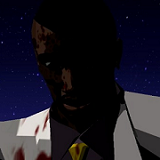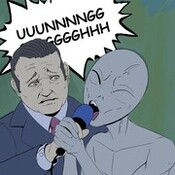|
SuperMechagodzilla posted:Aliens is the story of the military being called in to put down a labour uprising. The film is fundamentally about how the greedy middle-manager Burke pushed the workers too hard, endangered them in pursuit of the alien 'unobtainium', and unwittingly triggered a wave of violence. Aliens is totally not a commentary about forcing the work force so far that they rebel and fight back. SuperMechagodzilla posted:Ripley says "I don't know which species is worse!", because she stands for 'green' business practices, 'natural balance', and maintaining harmony between the exploiter and the exploited. I think I remember this in the director's cut. Tenzarin fucked around with this message at 00:12 on Jun 20, 2017 |
|
|
|

|
| # ? May 20, 2024 12:29 |
|
I have changed things. There is no going back to the way things were. Things will never be the same again. Chapter 3: A FISHBOWL HELMET TO DEFEND AGAINST WITCHCRAFT Make no mistake, because we've had enough of those: Covenant is not random chaos and slaughter from a bunch of druggies. ("There is no random chaos and slaughter in a gothic, from my perspective.") Drugs cannot entirely account for what is taking place. There is something there. But if Prometheus is a Solaris narrative, then Covenant is much more Stalker. The outbreak is over. The 'black goo' has dissipated, and now there is only a desolate Zone where we find nothing special - perhaps even less than was expected. This was not even an important place - certainly not 'the Engineers' homeworld'. That's another clear example of franchise thinking in effect. People have assumed, based on expository dialogue from an entirely different film, that Covenant takes place in the home of the Gods - but what we are shown is a tiny medieval city of bald, beige-skinned peasants. And pay attention to the layout of the city, how it is organized around a central void. These are monks in a place of worship - Alien3's 'prison planet' on a grander scale, a race if simple humans likewise "waiting for God to return and raise his servants to redemption." To this end, they built their city around a landing site, awaiting a message from God. David enjoys the irony. In any case, the colonists' equipment is not a 'plot hole'. It is the plot. They are not 'supposed to be' wearing helmets, because the entire film centres around the fact that there is, objectively, nothing dangerous on the planet. The Star Trek scanners tell us there is no deadly bacteria, no toxic chemicals, etc. There is nothing there. The characters are, if anything, over-prepared; the computer detected some kind of large animals on the world, against which they might need guns, but the specific area they land in happens to be completely desolate. This place is less dangerous than the woods outside Burkittsville, Maryland. And yet, Maggie freaks the gently caress out, fires her weapon blindly in a confined space, and ends up killing herself. You see, she saw Ledward dazed and coughing, saw Karine writhing in a pool of blood - and so, in her panic and terror, Maggie glimpsed a little white creature...  ...skittering about on four limbs...  ...with a weirdly-shaped head. Hmm.  The point is simple: there is no danger on this planet, except what they brought with them. Maggie successfully quarantined Ledward, but there was no virus. Her 'rational' tactical response, her paranoia over disease, generated this little white imp - caused her to mispercieve the little droid as a horrible creature. That is the entire point of the 'prologue' video: long before reaching this planet, the characters choked, caught colds, experienced the uncomfortable tensions between eachother. But, once they reach the planet, suddenly these minor problems are magnified into life-or-death struggles. The monsters are literally from inside; the external threat to the colonists is their own inherent essence. It's as it is in one of Michael Crichton's Hollywood-styled novels - most notably his Prey (which is ostensibly about a cloud of deadly nanomachines, but featuring a dysfunctional marriage plot): "Far from providing a mere human-interest sub-plot, this family plot is what the novel really is about : it is the prey of nano-particles which should be conceived as a materialization of the family tensions. The first thing that cannot but strike the eye of anyone who knows Lacan is how this prey (swarm) resembles what Lacan, in his Seminar XI, called 'lamella': the prey appears indestructible, in its infinite plasticity; it always re-assembles itself, able morph itself into a multitude of shapes; in it, pure evil animality overlaps with machinic blind insistence." -Slavoj Zizek, on Michael Crichton's Prey "For any avid cinema-goer, it is difficult to avoid the feeling that he has already seen all this. Lacan’s description not only reminds one of the nightmare creatures in horror movies; more specifically, it can be read, point by point, as describing a movie shot more than a decade after he wrote those words, Ridley Scott’s Alien. The monstrous 'alien' in the film so closely resembles Lacan’s lamella that it cannot but evoke the impression that Lacan somehow saw the film before it was even made. -Slavoj Zizek The connection between the black spores and the facehugger is obvious, and (of course) entirely deliberate, as they are both forms of the lamella. But the point here is that Covenant hews closer to Prey: the alien spores are a materialization of family tensions - not so much related to tensions of race, sex and class as in Alien 1. As I said, everything in Covenant centres around the production of the couple - and the creatures are no exception. Note that there are always two: two 'neomorphs', and two 'xenomorphs', etc. They are implicitly trying to unite with eachother, to produce a perfect couple. So, while people have complained about lack of characterization, these scenes of violence are characterization in its purest form. We are shown Ledward's exceedingly honest reaction to having to babysit Oram's wife. And this is likely why Hallett vomits to death after seeing Ledward is gone. There's an adultery subtext. That is why Robert Eggers is right to insist that hallucinogenic fungus, alone, is not a sufficient explanation. You cannot wear a fishbowl helmet to defend against witchcraft. You can't kill it with a gun. The alien, like the VVitch and the Blair Witch that haunt their respective colonies, does not actually exist - but it nonetheless persists as a belief, a way of making sense of something far more terrifying and inexpressible. The alien drug is merely an accelerant.
|
|
|
|
Leavemywife posted:So, SMG, did you write that at the strip joint where you work, or was it still written one handed? This joke is bad, forced and phrased horribly. Do you post on Reddit?
|
|
|
|
SuperMechagodzilla posted:The point is simple: there is no danger on this planet, except what they brought with them. So the rape victim is at fault? David instantly killed all the engineers and turn lady character into a table but the new humans are at fault for listening to a radio signal and flying to the planet? At least these humans don't outright hate robots. I recall none of them say anything anti robot. Tenzarin fucked around with this message at 02:37 on Jun 20, 2017 |
|
|
|
Jonah Galtberg posted:This joke is bad, forced and phrased horribly. Do you post on Reddit? He's not a native speaker man. C'mon.
|
|
|
|
Tenzarin posted:So the rape victim is at fault? David instantly killed all the engineers and turn lady character into a table but the new humans are at fault for listening to a radio signal and flying to the planet? I think you are confused.
|
|
|
|
Jonah Galtberg posted:This joke is bad, forced and phrased horribly. Do you post on Reddit? Oh, c'mon, it's not that ba- Oh. It is. It really is.
|
|
|
|
Not sure why, but this whole 'I read what I want into this' approach to criticism has always bothered me. It's like an insult to my experience of a movie, because it always pretends to be more educated and having some deep understanding of art and the author's intentions. Scoffing at me and demanding respect, while simultaneously demeaning what I thought of the piece in a weird passive-aggressive way. Proclaiming death of the author and then doing 180° and using the author to justify your pseudointellectual positions. How do you know that the movie/author/director meant for David and Walter to represent the dualism a single character, and which one - David, Walter?... Because everytime I read one of these posts it always contains the phrase "The movie wants to show us/telling us... The directors is trying to tell us..." How do you know this, do you have some supernatural power that allows you to read minds? Because otherwise you have no higher authority over what the movie TRIES to say. Oh look, Fassbender is playing two characters - so what? If you are saying that it somehow points to David and Walter being a single character, you need to demonstrate it, and you can't because every single scene in the movie contradicts you. The Android at the end is David. Ridley Scott confirms it apparently in this podcast https://m.soundcloud.com/empiremagazine/alien-covenant-spoiler-special-with-sir-ridley-scott#t=0:00
|
|
|
|
This analysis of the themes, metaphors, and allegories in Prometheus and Covenant is loving amazing: http://www.audienceseverywhere.net/david-modern-frankenstein-romantic-analysis-alien-covenant/ Here is a tiny part of it: quote:Alien: Covenant is similarly occupied with this kind of collapse–the xenomorph is a “perfected” personification of those amoral, perennial forces. However, David’s pursuit of the sublime, of that “perfect organism,” is not a process that destroys him as it does Frankenstein, to reveal a lesson about the perils of aspiring to godhead (the sin that afflicts both Satan and humankind in Paradise Lost). Rather, it is David’s ‘other’ ontology, the fact that his identity is not unitary, that allows him to face the indifferent, annihilating forces behind the “the life of things” and use those forces for his own ends. With David, there is nothing to dismantle. Again, he acts as a Frankenstein figure even while he inverts it: unlike the Covenant and Victor Frankenstein’s laboratory, spaces that build the hope and possibility for new life, David’s spaceship contains only the promise of death and oblivion. As a dark inversion of the Romantic poet, David does not seek the sublime as an end. He seeks instead to harness it as an answer to the nothingness rotting at the heart of human existence. And in creating the xenomorph, David’s response seems clear: if nothingness awaits us at the end of all this spiritual, existential yearning, what use is the ability to ponder it? Our thoughts, our anxieties, and our very cultures, are centered around an aimless, purposeless striving that clouds our natures as organisms. I hope SMG reads it.
|
|
|
|
|
Monglo posted:Not sure why, but this whole 'I read what I want into this' approach to criticism has always bothered me. Monglo...thank you.
|
|
|
|
"...the black... deadly... cleansing... lotion"
|
|
|
|
Reminder that "Mother" or whatever on the ship calls him "David" at the end when starting up the orchestral music. This isn't subtext argument or anything, it is literally text that David took Walter's place after somehow overpowering him and then mutilating himself to pass as Walter until the crew got back in the cryo-pods or whatever.
|
|
|
|
biracial bear for uncut posted:Reminder that "Mother" or whatever on the ship calls him "David" at the end when starting up the orchestral music. This isn't subtext argument or anything, it is literally text that David took Walter's place after somehow overpowering him and then mutilating himself to pass as Walter until the crew got back in the cryo-pods or whatever. This is not actually the argument.
|
|
|
|
Monglo posted:Not sure why, but this whole 'I read what I want into this' approach to criticism has always bothered me. you seem to really take this personally. why is it an insult to you if people like the movie?
|
|
|
|
HUNDU THE BEAST GOD posted:This is not actually the argument. K. Waste posted:It's not David. It's Walter. Uh, right, but it's silly to think it was never possible to be confused, that is to see why people might be thinking that's the argument. The reading is inaccurate to trying to convey itself. If you do the labor of reading/interpreting a continuity of posts from its writer there are interesting truths. but you have to, and I am not saying this ironically, navigate the fantasy that SMG puts up.
|
|
|
|
SuperMechagodzilla posted:I have changed things. There is no going back to the way things were. Lmao
|
|
|
|
SuperMechagodzilla posted:I have changed things. There is no going back to the way things were. This owns
|
|
|
|
Corrosion posted:Uh, right, but it's silly to think it was never possible to be confused, that is to see why people might be thinking that's the argument. I'm not talking about the writer, I'm talking about the movie.
|
|
|
|
SuperMechagodzilla posted:I have changed things. There is no going back to the way things were. So, seriously, this is like a joke, right? You don't actually believe any of this, right? Like, sure, there is some depth to convenant, but most of what you expound on is the shallow parts of it.
|
|
|
|
HUNDU THE BEAST GOD posted:I'm not talking about the writer, I'm talking about the movie. No, I was talking about the arguments about the movie, not the writer saying it was David. I'm saying, sorry, there's enough for a motivation/naturalization reading of Walter turning into David that someone would want to better explain why we should figuratively see them as the same rather than assume people know what that means. The confused post above me is a pretty good reason why. For all the criticism of echo chambers, I would think the good Christian would be interested in teaching people how to fish. The mask I am using to really mean "read."
|
|
|
|
Covok posted:So, seriously, this is like a joke, right? You don't actually believe any of this, right? Like, sure, there is some depth to convenant, but most of what you expound on is the shallow parts of it. You should see his analysis of a goofy movie
|
|
|
|
Monglo posted:Not sure why, but this whole 'I read what I want into this' approach to criticism has always bothered me. I just really like the film, and have presented an ideological and psychological reading which is consistent with the text. I have at no point either claimed death of the author or used Ridley Scott's words to justify my reading. I have discussed motivation in the sense of the difference between the spectator observing the literal plot and the formal articulation of this narrative. David and Walter appearing in separate scenes and being treated as separate characters does not contradict the reading. Again, that is the literal plot of the film, that David and Walter are unique characters, and that the appearance of one versus the other at the climax is a horrific realization. But it is futile to maintain that there isn't a duality between them, that the framing of the narrative with these characters and their conflict isn't expressed in the film, because that's the persistent focus of whenever both characters are on screen together - that one is trying to 'seduce' the other, that there are conspicuous parallels between them (Walter has Daniels, David has Shaw - Walter has the Covenant, David his own embryonic laboratory), that what one calls "duty" the other calls "love." David is already a horrific reflection of what Peter Weyland's legacy actually is, contrasted with the naive mission of the colonists to save the human race through colonialism and re-population. Corrosion posted:Uh, right, but it's silly to think it was never possible to be confused, that is to see why people might be thinking that's the argument. Except I was responding specifically to the question of 'why didn't David have the scar on his neck?' Since that point, what I have actually described is the synthesis of these two characters through a dramatic twist and deliberate montage. So, "It's not David. It's Walter." is still a statement which is consistent with the symbolic and aesthetic order of the film. It really is just Michael Fassbender dressed as Walter. He is playing David in disguise, but the persistent thematic issue is that there's functionally no difference, that without being encumbered by the banal, literal explanation of how David overcame Walter, or Walter took David's mantel, we are left instead with the perverse revelation of what the Covenant/Walter always were, that instead of the abhorrent monster finally being conquered by 'superior'/'upgraded' technology, there has actually been a subliminal synthesis of this monster with the entire apparatus.
|
|
|
|
Corrosion posted:The confused post above me is a pretty good reason why. For all the criticism of echo chambers, I would think the good Christian would be interested in teaching people how to fish. The mask I am using to really mean "read." Characters in movies(and all stories really) represent things. A lot of the time they represent aspects of humanity, things that most of us can identify with because we've experienced them. Anger, love, jealousy, various fears, aspirations and regrets, etc. So when multiple characters are played by the same actor, almost every single time that's a signal that we should be looking at them and interpreting them as a way to explore the conflicted nature of our own human experience. That being said, I still say there's no harm in letting that fall to the wayside for a bit and discussing a film purely on a plot level. Sometimes that's more fun in its own way, but some people can't let that kind of conversation pass without reminding you that you're "missing the point" or whatever.
|
|
|
|
K. Waste posted:Except I was responding specifically to the question of 'why didn't David have the scar on his neck?' Since that point, what I have actually described is the synthesis of these two characters through a dramatic twist and deliberate montage. So, "It's not David. It's Walter." is still a statement which is consistent with the symbolic and aesthetic order of the film. It really is just Michael Fassbender dressed as Walter. He is playing David in disguise, but the persistent thematic issue is that there's functionally no difference, that without being encumbered by the banal, literal explanation of how David overcame Walter, or Walter took David's mantel, we are left instead with the perverse revelation of what the Covenant/Walter always were, that instead of the abhorrent monster finally being conquered by 'superior'/'upgraded' technology, there has actually been a subliminal synthesis of this monster with the entire apparatus. No, I get your meaning, I'm saying you're not doing a very good job of putting what you have here now to me. I'm not talking about your argument being consistent within itself, I'm talking about it being persuasive. Have you ever read Alan Palmer's Fictional Minds? There's an observation there called "Continuing Consciuousness Frame" that's more insightful to me than a guy running in here and saying people were "talking around the movie" or calling it "franchise thinking." Again, saying it's "really just Michael Fassbender" is cute, because I know I understand what you mean by that. I don't disagree. When you endorse "navigating the fantasy", there's a lot more to unpack there than I think you give credit for. And so you come across as talking down or, since I know SMG wants to claim he doesn't exist while actually existing within the confines of perception and affect, I think it does a bad job of explaining how you come to these conclusions. Yes, Michael Fassbender is actually just playing a character and you've interpreted that. I'm not at a disagreement with the spirit of your findings, but I think most people rightfully aren't so forgiving. Basebf555 posted:Characters in movies(and all stories really) represent things. A lot of the time they represent aspects of humanity, things that most of us can identify with because we've experienced them. Anger, love, jealousy, various fears, aspirations and regrets, etc. So when multiple characters are played by the same actor, almost every single time that's a signal that we should be looking at them and interpreting them as a way to explore the conflicted nature of our own human experience. I'm not referring to actually thinking that David and Walter exist, I'm saying that it's useful to address things that you might read from Perry and Sternberg, or even motivation/naturalization. Why audiences might think David and Walter are separate entites. To show people how to navigate text and come to these conclusions. Let's not assume that the effect of fiction being artifice doesn't require explanation. What's your methodology to the conclusion you've presented me? Why do you know this? Asking why seems asinine, but you can simply redirect it to the 3 part reading, an interesting reading, that's been presented already. I like the naturalized reading of David and Walter as separate, because I think there's enough in the movie to substantiate that presenting David at the beginning of the movie marks the intentions of Weyland, which is an allusion to the events of Prometheus by nature of continuing consciousness frames. That characters are enduring, that I not only thought of Alien Covenant, but the movie that preceded it and how David was a piece of technology that was assumed to have one function, and how that assumption gets people killed. Thinking that technology is separate in this way means that David and Walter are both the same and different to me. The reading where Walter and David are different is a criticism of technology and how we're seeking to produce AI. What David imparts to Walter as two temporally separate beings is as insightful to me, and as correct, as saying that they are the same. It's not a matter of "We can never know." Corrosion fucked around with this message at 18:58 on Jun 20, 2017 |
|
|
|
Wait, we need to read all the chapters to see how he ties all this together.
|
|
|
|
The movie begins and ends in the same room on the colony ship Covenant, beginning with Walter discarding a dead human embryo and ending with David replacing it with an embryo of death incarnate. Hard not to see the symbolism there. The alien films have never been very fond of the institution of humanity. Capitalism and its machines have been linked with the alien terror since the first movie. Arglebargle III fucked around with this message at 19:06 on Jun 20, 2017 |
|
|
|
Corrosion posted:Let's not assume that the effect of fiction being artifice doesn't require explanation. What's your methodology to the conclusion you've presented me? Why do you know this? Asking why seems asinine, but you can simply redirect it to the 3 part reading, an interesting reading, that's been presented already. I don't really have a methodology other than having watched thousands of films and read hundreds and hundreds of reviews and film criticisms. Reading film doesn't have to be as academic as you're making it out to be.
|
|
|
|
David is Dionysian, Walter is Apollonian duh.
|
|
|
|
Covok posted:So, seriously, this is like a joke, right? You don't actually believe any of this, right? Like, sure, there is some depth to convenant, but most of what you expound on is the shallow parts of it. I guess he's notorious for this? I'm still trying to figure it out.
|
|
|
|
SMG posts are long and weird and mostly his own crazy "head canon" but within the madness are often some interesting thoughts and interpretations. Where SMG fails isn't his interpretations, they're interesting, it's his belief that they are the true and good objectively correct interpretations and any different interpretation due to a lack of watching the movie properly or, my god, not understanding hegel and so forth.
|
|
|
|
Basebf555 posted:I don't really have a methodology other than having watched thousands of films and read hundreds and hundreds of reviews and film criticisms. Reading film doesn't have to be as academic as you're making it out to be. But I'm not talking about academic pre-requisite, I'm saying that there comes a point where you might have to explain a conclusion you've come to if there's a possibility your understanding isn't self-evident. The counter claim to the actual arguing of these things is "But I'm talking about the movie, not the author's intent", and the instant I say that's not good enough we arrive here. I'm saying that given that there are plenty of frameworks for understanding and reading, saying I shouldn't be so academic is why I'll say "Your experience ain't that nice." What is it about fiction that necessitates us to be careful? Why could one misinterpret or misread? These aren't solely the realm of academic answers or questions, though academia certainly has helped me. My having mentioned certain books wasn't an insistence that a reading is only legitimate if you have academic sources and methods. But it certainly doesn't hurt to break certain things down if a person clearly doesn't understand where your thoughts might be coming from or if your experience doesn't necessarily speak for itself.
|
|
|
|
Baronjutter posted:SMG posts are long and weird and mostly his own crazy "head canon" but within the madness are often some interesting thoughts and interpretations. Where SMG fails isn't his interpretations, they're interesting, it's his belief that they are the true and good objectively correct interpretations and any different interpretation due to a lack of watching the movie properly or, my god, not understanding hegel and so forth. God forbid a person believe what they say.
|
|
|
|
Baronjutter posted:SMG posts are long and weird and mostly his own crazy "head canon" but within the madness are often some interesting thoughts and interpretations. Where SMG fails isn't his interpretations, they're interesting, it's his belief that they are the true and good objectively correct interpretations and any different interpretation due to a lack of watching the movie properly or, my god, not understanding hegel and so forth. ZIZEK.
|
|
|
|
Schwarzwald posted:God forbid a person believe what they say. David is Goofus, Walter is Gallant.
|
|
|
|
Schwarzwald posted:God forbid a person believe what they say. But he's just so smug. He thinks he's right and talks down to people. It's way worse than how literally ever other poster is constantly bantering and expressing their own strongly held opinions and dissing other people's taste becau
|
|
|
|
Corrosion posted:But I'm not talking about academic pre-requisite, I'm saying that there comes a point where you might have to explain a conclusion you've come to if there's a possibility your understanding isn't self-evident. The counter claim to the actual arguing of these things is "But I'm talking about the movie, not the author's intent", and the instant I say that's not good enough we arrive here. I'm saying that given that there are plenty of frameworks for understanding and reading, saying I shouldn't be so academic is why I'll say "Your experience ain't that nice." What is it about fiction that necessitates us to be careful? Why could one misinterpret or misread? When I say you shouldn't be so academic, I'm trying to tell you that its ok to have a different reading a film, no matter what any CineD jackass may tell you. Just because someone smugly dismisses your reading doesn't mean its not legitimate, but I'm not sure what to tell you about that, it's just a part of discourse(especially on the internet). But if we're talking about the most basic of concepts, like the idea that characters in stories represent aspects of our own humanity, well yea I really think that should be self-evident for someone who's been around a while and heard a lot of different stories in various forms. Death of the Author isn't even relevant to most concepts like that, when someone sits down to write a story they project their own humanity or the humanity of others around them onto the characters regardless of their intent.
|
|
|
|
Assembly Cut of Alien 3 is still garbage. Furthermore
|
|
|
Arglebargle III posted:The alien films have never been very fond of the institution of humanity. I think their portrayal of humanity in the future is (will be) very accurate. Big corporations like Apple and Google will be building spaceships & AI by then. I just don't see the state being around or relevant when that happens.
|
|
|
|
|
RedSpider posted:I think their portrayal of humanity in the future is (will be) very accurate. Big corporations like Apple and Google will be building spaceships & AI by then. I just don't see the state being around or relevant when that happens. This is why I thought that alien 3 script that was all about space USA vs space communism felt very very out of place in the alien universe. It's a setting where "late stage capitalism" has consumed humanity and absolutely stagnated.
|
|
|
|

|
| # ? May 20, 2024 12:29 |
|
Basebf555 posted:When I say you shouldn't be so academic, I'm trying to tell you that its ok to have a different reading a film, no matter what any CineD jackass may tell you. Just because someone smugly dismisses your reading doesn't mean its not legitimate, but I'm not sure what to tell you about that, it's just a part of discourse(especially on the internet). Asking for how you came to your conclusions isn't solely relegated to academia, nor have I presented a rejection of having different readings. I've presented a rejection of their argumentation, that the explanation of images clearly isn't just the surface of the film if you have to incorporate footnote and comparison.
|
|
|




























